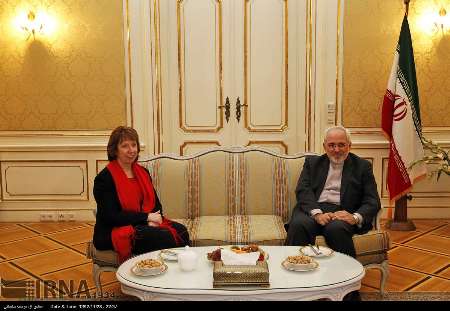ID :
317940
Tue, 02/18/2014 - 13:59
Auther :
Shortlink :
https://oananews.org//node/317940
The shortlink copeid
Zarif-Ashton Decide Negotiationsˈ Road-map Over Working Dinner

Vienna, Feb 18, IRNA – Iranian foreign minister and EU foreign policy chief drew the roadmap for Tuesdayˈs Iran-P5+1 nuclear negotiations, over their working dinner in presence of their deputies here Monday night.
Mohammad-Javad Zarif who arrived in Vienna on Monday morning, leading the Iranian team of nuclear negotiators and is lodging at Viennaˈs Palais Coburg Hotel met and discussed the two sidesˈ proposed methods for pursuing the nuclear talks on Iranˈs nuclear program at the Islamic Republic of Iran Representative Office in IAEA.
Also present at the working dinner there were Iranian Deputy Foreign Minister for Legal and International Affairs Seyyed Abbas Araqchi, Deputy Foreign Minister for Europe and Americas Affairs Majid Takht-e-Ravanchi, and the EU top diplomatˈs special deputies, Helga Schmid and Stephan Clement.
The new round of talks between Iran and the UN Security Council Big 5, plus Germany are aimed at reaching a comprehensive final agreement and are going to kick-start at the European headquarters of the UN in Vienna on Tuesday in the presence of Zarif and Ashton.
The Iranian team of negotiators, as the Foreign Minister Zarif has emphasized, will enter the tough, condensed, and complicated negotiations, keeping in mind Iranˈs rights and interests.
The joint objectives of the talks, according to Zarif, are defined in the Geneva Joint Plan of Action, which includes the continuation of the Iranian nuclear program, while gaining the other sideˈs trust and certainty over its non-military, peaceful nature, which should basically not be a tough job.
The negotiations that will start on Tuesday are scheduled to lead to a comprehensive final agreement minimum within six months from November 24, 2014, and maximum 12 months from that date, although the Iranian officials, including the top nuclear negotiator Zarif, believe six months is quite sufficient for the job, if the other side enters the talks with good will.
Ashton has on the contrary said that achieving a final agreement in six months is a remote possibility, although she too, has said that the other side would do its best to resolve the matter rapidly.
According to the Iranian side, the matters to be discussed in this round of talks will be the general issues, so that entering the talks on details and their barriers would be possible in the future.
A member of the Iranian team of negotiators, Hamid Baˈeidinezhad says that using the new, advanced centrifuges and the Arak heavy water nuclear reactor are among the most significant issues to be discussed to reach a final agreement.
The final step must also be reflective of the rights and commitments of the signatory members of the nuclear Non-Proliferation Treaty (NPT), and the agreements of the IAEA safeguards, including an enrichment program that needs to be defined by both sides.
The final agreement must also ease off the whole worries regarding the Arak heavy water research reactor and put to effect transparent moves under greater supervision based on the agreements, including accepting the NPT Additional Protocol after the confirmations of the president and the parliament.
In the final step meanwhile it should be guaranteed that the entire UN nuclear sanctions, as well as the unilateral and multilateral sanctions in commercial, technological, financial, and energy fields will be lifted in accordance with a chronological plan.
After the final step the Iranian nuclear program will have to be treated like the nuclear programs of all other member countries of the nuclear Non-Proliferation Treaty./end





